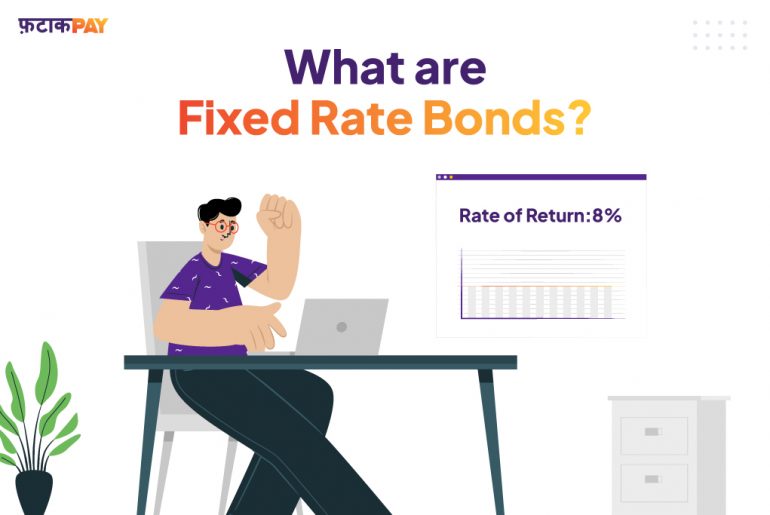Fixed Rate Bonds
A form of financial instrument known as a bond is one in which the investor lends money to the issuer. An issuer can be the government, a bank, or a corporation, and it borrows money for a set period of time at a defined interest rate. Fixed rate bonds are one form of bond that these entities issue.
Bonds with fixed rates, commonly referred to as fixed income securities, are a type of debt product that provides a guaranteed income guarantee. These bonds have a maturity date and a fixed interest rate for the duration of the term. In other words, interest payments are anticipated. In light of this, fixed income securities provide investors with a steady flow of fixed interest payments known as coupon payments.
The issuers of these bonds are both the government and private businesses. They come in both short- and long-term varieties. These bonds are issued by the government or businesses to raise the money needed to finance their daily operations. The investor purchases a bond that the government issues for a certain price and term.
They provide the investor with consistent interest payments in exchange. At the bond’s maturity, they finally return the investment. The face value, then, is the sum that the investor will be paid when the bond matures.
How do Fixed Rate Bonds work?
Aside from stocks (equities), cash, and cash equivalents, fixed rate bonds are one of the common asset classes amongst investors.
Both parties engage into a contract when the borrower (the government) issues fixed-rate bonds to the lender. The bond’s issuer guarantees that the principal sum will be returned on the bond’s maturity date. Additionally, for the duration of the loan period, the issuer pays interest on the borrowed funds (coupon payment).
The bond, for instance, has a face value of INR 1,000. The coupon rate will be set by the issuer. The market price or issue price of the bond will be determined by the borrower’s creditworthiness, the time left until maturity, and the coupon rate.
A fixed rate bond contains all the information regarding the borrowed sum, the date of maturity on which the investor will receive their money back, and the specifics of the coupon payments, including the coupon rate.
Following the issuance of the fixed-rate bonds, the bondholders are eligible to collect interest on a yearly, semi-annual, or monthly basis. The bondholder will also get the face value, or principal amount, upon maturity.
The funds can be transferred to another account or withdrawn. Additionally, based on the conditions stated on the debt instrument, they may think about reinvesting the same into another account.
For instance, a fixed-rate bond with a maturity date of 2 June 2019 was issued on June 2nd, 2009, for a term of 10 years. It was issued with an 8.15% coupon rate and was paid out twice a year, in December and June, on the face value.
Advantages of Investing in Fixed Rate Bonds:
1. Fixed Returns:
One of the major benefits of fixed rate bonds is that investors are aware of the interest they will earn on their deposit for a fixed investment tenure. Also, upon maturity, the principal amount (face value) of the bond is paid back to the investor. Furthermore, in comparison to other fixed saving options, investing in fixed rate bonds offer better returns.
2. Low Risk:
Bonds with fixed rates carry less risk than securities traded on the stock market. Bonds can withstand market volatility (such as a market slump), which is the reason. Due to this, investors may be able to create a better financial plan and connect it with the accomplishment of their financial objectives.
3. Safety:
These bonds are rated by credit rating firms according to how creditworthy they are. Bonds issued by corporations, on the other hand, carry greater risk. Therefore, investing in fixed rate bonds ensures that the investor will receive both interest and principal repayment.
Bonds issued by the government bear no risk, therefore an investor cannot lose money. While investing in highly rated securities can reduce risk, corporate bonds nevertheless entail some risk.
4. Diversification:
Fixed rate bond investments aid in maintaining an equity balance in the portfolio. The fixed return balances out the fluctuation of the market. Therefore, these bonds provide a means for saving money to meet the demands and wants of the investor.
They can pick a tenure that corresponds to their financial objective. As a result, the investor’s financial strategy will be improved as a result of this.
Disadvantages of Investing in Fixed Rate Bonds:
1. Credit Risk:
When the borrower is unable to pay back the principal and interest, credit risk develops. By making investments in highly rated fixed income products, this risk can be minimised. Additionally, fixed rate government bonds with no default risk are an option.
2. Interest Rate Risk:
The ability of investors to generate attractive profits may be compromised by rising inflation. Bond prices are also indirectly correlated with interest rates. In other words, as bond prices increase, interest rates decrease, and vice versa, when bond prices decrease, interest rates increase.
In addition, the price of the bond at maturity can be lower than it was when it was first issued. Due to the frequent rate changes, long-term bonds are frequently more likely to be linked to inflation risk.
3. Liquidity Risk:
When the investor is unable to immediately sell the asset, liquidity risk develops. These bonds tend to lack liquidity, which means that there may not be a active market where investors can sell their investment.
Additionally, there may be a lock-in period before which bonds cannot be redeemed. Despite the great liquidity of government assets, there is a cost associated with early money withdrawals from fixed rate bonds.
Who Should Invest in Fixed Rate Bonds?
One of the safest investing options in India are fixed rate bonds. It is appropriate for those who prefer safety over risk and have a low risk tolerance level. Typically, there is risk associated with investing in market-linked securities (such as stocks). Therefore, for investors who lack stock market experience, these bonds also serve as a long-term investment choice.
Fixed income securities often involve less risk. Investors who have less time to recover their losses may find these assets to be a viable option. The inflation risk, which might result in the investments losing value over time, should be taken into account. Additionally, fixed rate bond investments can give investors a reliable stream of income.
To sum up, this bond may be appropriate for investors who want to generate consistent, fixed returns over a set period of time. Growing investments over time will assist in saving for retirement or other long-term objectives. By purchasing these bonds, an investor can also diversify their portfolio.
Additional links:
Thank you for reading our blog! Here are some other blogs/LinkedIn articles for you to check out.
https://www.linkedin.com/pulse/what-nbfc-fatakpay/?trackingId=D2%2B1JHBR2HJnAYNnR2K8Rw%3D%3D
https://fatakpay.com/blog/what-is-credit-risk/ https://fatakpay.com/blog/mutual-funds-vs-etfs/
About FatakPay:
FatakPay provides virtual credit facilities for all. It’s available on your phone and caters to your everyday needs in both online and offline formats. Payments are done seamlessly through UPI/QR codes. The solution provides an almost zero cost, free, quick, transparent and secure way to transact in a multilingual format with a Scan Now, Pay Later facility and easy repayment options.
Link to FatakPay App: https://play.google.com/store/apps/details?id=com.fatakpay
Link to the Website: https://fatakpay.com/






